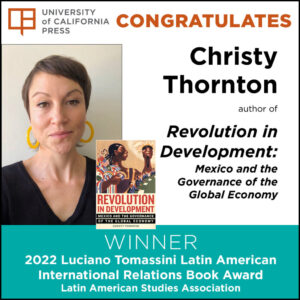UC Press is proud to publish award-winning authors in Latin American Studies. Below are recent authors who have earned honors from the Latin American Studies Association. Please join us in celebrating these scholars by sharing the news!
María Elena García

2022 Flora Tristán Prize for Best Book, Peru Section
Latin American Studies Association
María Elena García is Professor in the Comparative History of Ideas Department at the University of Washington.
Gastropolitics and the Specter of Race:
Stories of Capital, Culture, and Coloniality in Peru
In recent years, Peru has transformed from a war-torn country to a global high-end culinary destination. Connecting chefs, state agencies, global capital, and Indigenous producers, this “gastronomic revolution” makes powerful claims: food unites Peruvians, dissolves racial antagonisms, and fuels development. Gastropolitics and the Specter of Race critically evaluates these claims and tracks the emergence of Peruvian gastropolitics, a biopolitical and aesthetic set of practices that reinscribe dominant racial and gendered orders. Through critical readings of high-end menus and ethnographic analysis of culinary festivals, guinea pig production, and national-branding campaigns, this work explores the intersections of race, species, and capital to reveal links between gastronomy and violence in Peru.
Gema Kloppe-Santamaría

2022 Maria Elena Martinez Book Prize, Honorable Mention
The Conference on Latin American History
Gema Kloppe-Santamaría is Assistant Professor of Latin American History at Loyola University Chicago. She is the lead editor of Violence and Crime in Latin America: Representations and Politics and Human Security and Chronic Violence in Mexico: New Perspectives and Proposals from Below.
In the Vortex of Violence: Lynching, Extralegal Justice, and the State in Post-Revolutionary Mexico
In the Vortex of Violence examines the uncharted history of lynching in post-revolutionary Mexico. Based on a collection of previously untapped sources, the book examines why lynching became a persistent practice during a period otherwise characterized by political stability and decreasing levels of violence. It explores how state formation processes, as well as religion, perceptions of crime, and mythical beliefs, contributed to shaping people’s understanding of lynching as a legitimate form of justice. Extending the history of lynching beyond the United States, this book offers key insights into the cultural, historical, and political reasons behind the violent phenomenon and its continued practice in Latin America today.

Christy Thornton
2022 Luciano Tomassini Latin American International Relations Book Award
Latin American Studies Association
Christy Thornton is Assistant Professor of Sociology and Latin American Studies at Johns Hopkins University.
Revolution in Development: Mexico and the Governance of the Global Economy
Revolution in Development uncovers the surprising influence of postrevolutionary Mexico on the twentieth century’s most important international economic institutions. Drawing on extensive archival research in Mexico, the United States, and Great Britain, Christy Thornton meticulously traces how Mexican officials repeatedly rallied Third World leaders to campaign for representation in global organizations and redistribution through multilateral institutions. By decentering the United States and Europe in the history of global economic governance, Revolution in Development shows how Mexican economists, diplomats, and politicians fought for more than five decades to reform the rules and institutions of the global capitalist economy. In so doing, the book demonstrates, Mexican officials shaped not only their own domestic economic prospects but also the contours of the project of international development itself.

Kristin Wintersteen
2022 Bryce Wood Book Award, Honorable Mention
Latin American Studies Association
Kristin A. Wintersteen is a scholar of modern Latin America, environmental history, and global food studies. She earned her PhD in History from Duke University.
The Fishmeal Revolution: The Industrialization of the Humboldt Current Ecosystem
Off the Pacific coast of South America, nutrients mingle with cool waters rising from the ocean’s depths, creating one of the world’s most productive marine ecosystems: the Humboldt Current. When the region’s teeming populations of fish were converted into a key ingredient in animal feed—fishmeal—it fueled the revolution in chicken, hog, and fish farming that swept the United States and northern Europe after World War II.
The Fishmeal Revolution explores industrialization along the Peru-Chile coast as fishmeal producers pulverized and exported unprecedented volumes of marine proteins to satisfy the growing taste for meat among affluent consumers in the Global North. A relentless drive to maximize profits from the sea occurred at the same time that Peru and Chile grappled with the challenge of environmental uncertainty and its potentially devastating impact. In this exciting new book, Kristin A. Wintersteen offers an important history and critique of the science and policy that shaped the global food industry.

Corinna Zeltsman
2022 Howard F. Cline Prize
2022 19th Century Section Book Prize, Honorable Mention
2022 Best Book in Social Sciences, Mexico Section
Latin American Studies Association
Corinna Zeltsman is Assistant Professor of Latin American History at Georgia Southern University. She is trained as a letterpress printer.
Ink under the Fingernails: Printing Politics in Nineteenth-Century Mexico
During the independence era in Mexico, individuals and factions of all stripes embraced the printing press as a key weapon in the broad struggle for political power. Taking readers into the printing shops, government offices, courtrooms, and streets of Mexico City, historian Corinna Zeltsman reconstructs the practical negotiations and discursive contests that surrounded print over a century of political transformation, from the late colonial era to the Mexican Revolution. Centering the diverse communities that worked behind the scenes at urban presses and examining their social practices and aspirations, Zeltsman explores how printer interactions with state and religious authorities shaped broader debates about press freedom and authorship. Beautifully crafted and ambitious in scope, Ink under the Fingernails sheds new light on Mexico’s histories of state formation and political culture, identifying printing shops as unexplored spaces of democratic practice, where the boundaries between manual and intellectual labor blurred.